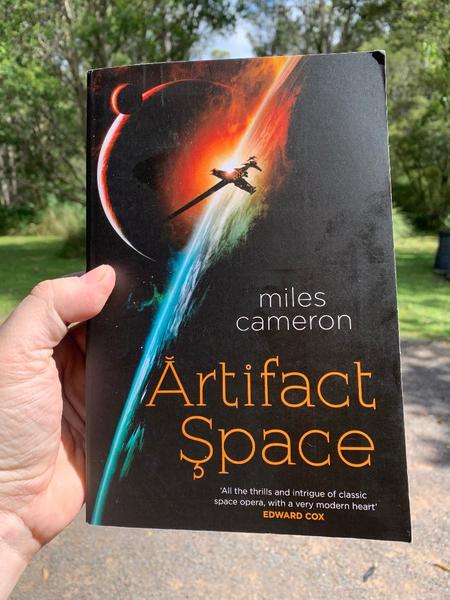One of the things that has always defined space opera in all its thrillingly expansive glory is the idea of starting anew.
Countless authors have filled their daring, action and adventure dashes across the universe with characters needing a fresh, life-transformative start, the kind which doesn’t come easy but which often results in wholesale change for the protagonist and for those fortunate enough to come into their orbit (or unfortunate depending on which side of the character divide they sit) and for the galaxies in which they roam.
It’s heady, exciting stuff to read and it suffuses every last word in Miles Cameron’s Artifact Space, a book which places a desperate person at the centre of its invigorating tale, someone who needs their new life to work and to mean something since they don’t have a plan B and can’t countenance remaining in the cruelly constrictive surrounds of the life they now occupy.
Marca Nbaro is from a place simply but damningly called the Orphanage, an imposing edifice in a massive orbital called City, the greatest non-planetside sized human settlement in space, which is supposed to give its charges the best possible start in life, educationally, at least.
Of course, it doesn’t do that with those in charge, who are corrupt and nasty in such a corrosive a way that they engender a Dickensian-laced, Lord of the Flies atmosphere, one which you have to be exceptionally talented and extraordinarily determined to escape.
Someone like Marca Nbaro.
“Later, Nbaro lay in her rack, listening to the sounds that a 400-year-old ship made when in port. The movement of fluid through the pipes in her stateroom; Thea’s delicate snores; the hum of various machines, far away aft, and the occasional, inexpressible pings of metal changing pressure; the slight, discordant ringing of the xenoglas conductor in the overhead, and the almost imperceptible high-pitched sound of the screen on the wall of the cabin.
It was a gentle cacophony, and it kept her awake and thinking for a long time.
This is all I want. Please, let me keep it.” (P. 50)
Using all the guile and cunning and ruthlessly efficient planning at her disposal, Nbaro realises her dream of securing an officer position aboard one of the Greatships (with fake paperers, no less), named after nine ancient cities on Old Terra (Earth) which is in poor shape but still the spiritual heart of human space which has now spread far and wide across 66 settled worlds.
These massive, ten-kilometre long ships of the space-based merchant navy which is the economic lifeblood of the Arcana Imperii Universe, navigate through countless galaxies, making stops to deposit and pick up goods, their 9000 or so officers and enlisted crew working hard, for the greater good and their own (they can run their own trades on the side within reason) to make human-occupied space viable, alive and rich beyond compare.
For hundreds of years, ever since the Age of Chaos pushed many people to flee Old Terra and find a new life out among the stars, the Greatships have made civilisation in the far regions of space possible but now someone, or something, is targeting the ships, picking them off one by one with explosively deadly intent and next up it seems is the Athens on which Nabro is serving with great and growing success.
Surrounded by friends such as stateroom mate Thea Drake, ship guide Petty Office Locran, Richard Hanna, the mysterious but likeable Horatio Dorcas, and admiring higher-ups such as Skipper Treukner, Captain Fraser and the head of the Athens himself, the Master, Nbaro is going from success to success, showing herself more than capable of rising to the challenges given to her which, with an unseen enemy trying again and again to destroy them, are considerable indeed.
Artifact Space is a compulsive read primarily because of the person of Marca Nbaro.
While Cameron’s worldbuilding is immaculately, immersively and imaginatively faultless, his characterisation rich and inviting and his narrative construction seamlessly impelling such that you will be turning the pages tearingly fast to get to the next thrilling development, the heart and soul of its brilliant storytelling is Nbaro who becomes the hero of the hour but not in a way which feels inauthentic or lacking in real, aching humanity.
Nbaro is someone who wants the new life she has got badly, and while others have been given a considerable head start on the road to merchant success thanks to their Patrician families who are one of the few vestiges of Old Terran hierarchical life – anyone is supposed to be able to make a success of their life in this future meritocracy but some things still rely on power, money and connection – any success Nabro enjoys is solely down to her urgent need to prove herself.
Thus she volunteers for every Watch she can on the ship, attends every class on offer and studies simulation after simulation, all in a pell-mell attempt to show she has what it takes and that she deserves to be on the ship; there’s no doubt she has every right to be there, and about just everyone on board, including the idiosyncratic but highly-knowledgeable ship Morosini, agrees, but Nabro catchphrase remains “I’m an idiot”, her self-flagellation borne of a hard graft start in life, standing in marked contrast to everyone around her.
“Then someone was leaning over her, slapping a dressing on her side. Agam. Smith’s friend. Nbaro tried to say ‘thank you’ and she tried to smile, because this wasn’t the Orphanage. This was Service, and these people were her people, and she was perfectly willing to die for them, the family she’d never had. She wanted to tell Agam that she was happy, fucking happy, to die for the ship. For him and Smith and Dorcas and Drake and Chu …
Instead, Nbaro gurgled a little, and there was blood in her mouth, and she was gone. (P. 396)
It’s this sizeable thread of real, affecting humanity that gives Artifact Space such lasting resonance.
With meticulous detail and real insight and empathy, Cameron constructs a story that gives you a startlingly vivid look into the world of future humanity but most particularly the life of those in the space-based merchant navy who draw on countless millennia of human tradition, including catchphrases aplenty (the origins of which are lost on many people who used them nonetheless) to do their jobs and build their lives.
This is humanity as it will be but also as it is now and Cameron brilliantly combines who we are now – the distant past in the book, of course – with who we will become to tell a tale that has all the energising highlights of classic space opera with a powerfully rich understanding of what it means to be someone who needs their new life to work or die trying.
While there have been and continue to be plenty of protagonists desperate to make a go of things in space operatic novels, Nbaro is one of the standouts, a character so relatable and accessible and movingly real that you can’t help but be drawn to her and her story, one which takes in a whole universe of conspiracy, violence and possible war, but which comes alive most importantly in the small intimate moments of raw humanity, the kind which give all the action energy and verve and which ultimately make it mean something.
Artifact Space is action with soul and heart and stunningly detailed worldbuilding and narrative momentum, so marvelously well written and realised with fully-realised characters and sparklingly vivacious and authentic dialogue that you will find yourself living its stories every bit as Nabro and her colleagues and friends, eager to find out what happens next and desperate for the kind of ending that someone as real and determined as Nbaro deserves and should get if there is any justice at all in the galaxy.

